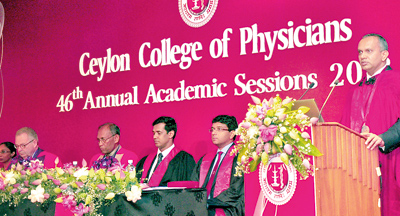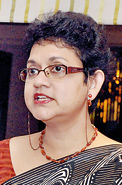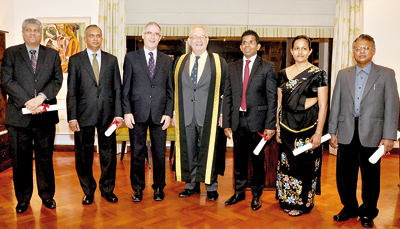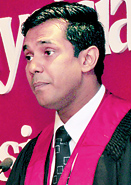News
From ground realities to outer space
- Annual sessions of the Ceylon College of Physicians
Riveting was the inauguration of the annual sessions of the physicians on Thursday, when the distinguished gathering of both local and foreign healers, was guided along the way forward right here on earth and later lifted to space to get a glimpse of the threats emerging from there.

The President of the Ceylon College of Physicians, Dr. Udaya Ranawaka addressing the gathering at the inauguration. Pix by Mangala Weerasekera
In the near future it will become clear that bacteria and viruses coming to the Earth from outside could sometimes pose serious threats of pandemic disease, not only to humans, but also to plants and animals, said Prof. Chandra Wickramasinghe, the Director of the Buckingham Centre for Astrobiology, University of Buckingham, United Kingdom, who was the Chief Guest at the inauguration of the 46th Annual Academic Sessions of the Ceylon College of Physicians (CCP) held at the Cinnamon Grand Hotel.
“The future lies in putting in place measures to monitor the stratosphere for incoming potential pathogens,” he urged, stressing that he believes there is an urgent need for the possibility of bacterial and viral ingress from space to be taken seriously.
“In the event of a threat being discovered, preventative measures such as the production of appropriate vaccines could be put in place. In this way it might be possible to avert the worst consequences of any future pandemic that could threaten us,” said Prof. Wickramasinghe.
Earlier, keeping the gathering on the ground, CCP’s President Dr. Udaya Ranawaka, who dubbed the sessions the “pinnacle and blue-ribbon event”, said that about 40% of the physicians in Sri Lanka are young physicians. They have qualified as specialists within the last five-year period.
Nearly two-thirds of the physicians are working outside the Western Province, he said, explaining that they are the ‘Physicians for the Future’, the future of the college, to whom the sessions are dedicated. The academic sessions themed ‘Physicians for the Future’ were held in collaboration with the Royal College of Physicians (RCP) of London, United Kingdom.
The focus of the year’s academic programme has been to reach out to young physicians in the periphery through a strong regional meeting programme, the Sunday Times learns. With one planned for each province, several have already been held with the others on track to be rounded off by the end of the year.
Dr. Ranawaka pointed out that the CCP has placed strong emphasis on new advances in medicine and assured its commitment to enabling young physicians to meet the different challenges of the 21st century. Recalling the six different roles modern-day physicians have to play, he said physicians are ‘healers’ and that is “what we are primarily trained to do”. There really is nothing more rewarding than that in life.
But gone are the days when physicians could be mere healers of the sick, according to him, for they also have to be ‘learners’, learning everyday and ‘teachers’ imparting knowledge and skills to juniors, colleagues and those in nursing and other health care professions as well as to patients and the community.

Dr. Naomali Amarasena who presented the five doctors for the Fellowships
“We also have to be ‘seekers’, seeking out the truth, and wherever we are, we can do some research to contribute to scientific knowledge,” said Dr. Ranawaka, adding that all of us should be ‘builders’, doing something to improve the set up, the structure and the processes of care, wherever we are. “We all have to be ‘team leaders’ too, providing leadership to a health care team.’’
The college is committed to helping young physicians, the ‘Physicians for the Future’, to hone their skills in playing out these different roles. The main academic sessions are all about learning and teaching and making ourselves better equipped to be better healers, he reiterated.
The Guest-of-Honour at the inauguration was RCP’s Academic Vice President, John Wass, while among those present were the President of the College of Physicians and Prof.Surgeons, Pakistan, Prof. Zafar Ullah Choudhry and delegates from the United Kingdom, United States, Australia, Thailand, Singapore and India.
History made as RCP awards fellowships outside Britain
It was history in the making in medical circles in Sri Lanka, when a small group of eminent doctors gathered at Westminster House on Wednesday, to be awarded Fellowships by the Royal College of Physicians (RCP) of London. For, it was the first time that the RCP of London, the oldest medical college in England, held its Fellowship Awards Ceremony outside home-ground and in Colombo, Sri Lanka.

From left Dr. Panduka Karunanayake, Dr. Udaya Ranawaka, High Commissioner John Rankin, Prof. John Wass, Dr. Gotabhaya Ranasinghe, Dr. Yamuna Dasanayake and Dr. Harith Wimalaratne at the Fellowship ceremony. Pix by Indika Handuwala
RCP’s Academic Vice President Prof. John Wass handed over the Fellowships to five physicians during a simple ceremony at the residence of the British High Commissioner, John Rankin. These were Physicians who had been honoured with the Fellowships earlier, but not been able to receive them in London.
Pointing out that Sri Lanka has a high concentration of Fellows in Asia, Prof. Wass said that “Sri Lankan doctors are not only knowledgeable but also have human empathy”. Seventy-five percent of international trainees are from Sri Lanka and they “are highly treasured”.
Earlier, Prof. Wass who pointed out that this was the first-time ever Fellowships were being awarded outside London, called it a “little bit of history in the making”.
“Mysterious,” is the way in which you get elected for a Fellowship and also complicated, he said, explaining that there has to be distinguished service not just overnight but over a long period of time. Then the names go through “innumerable committees” onto the council, after which the list goes to all Fellows of the RCP who have veto powers. This is the “rigorous” procedure through which new Fellows emerge.
Rigorous it would be because, as the founding charter of the RCP had decreed back in 1518, the RCP would “curb the audacity of those wicked men who shall profess medicine more for the sake of their avarice than from the assurance of any good conscience, whereby many inconveniences may ensue to the rude and credulous populace”.
The P.B. Fernando oration

The P.B. Fernando Orator, Dr. Suneth Agampodi, speaking on Leptospirosis
The P.B. Fernando Oration on ‘Leptospirosis’ was delivered by Dr. Suneth Agampodi, Consultant Community Physician and Lecturer at the Faculty of Medical and Allied Sciences, University of Rajarata.
Meanwhile, the ‘Most Innovative Outstation Physician for the Year’ was Dr. Shamitha Dassanayake, Acting Physician of the Padaviya Hospital, who has done pioneering work in the care of patients with Chronic Kidney Disease of unknown origin.
comments powered by Disqus
